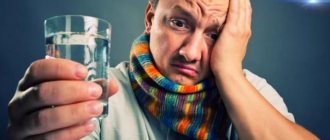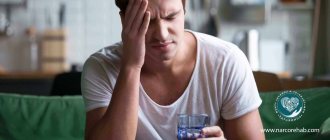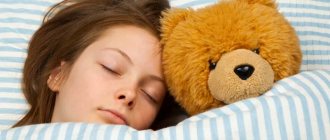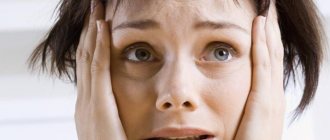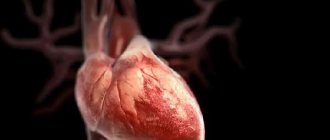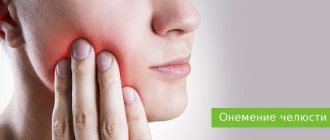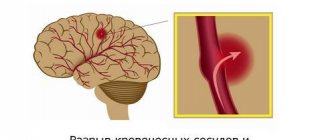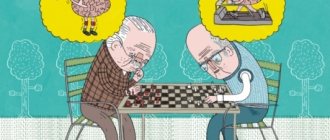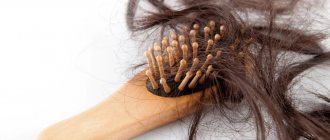Clinical studies demonstrate a link between alcohol dependence and disruption of circadian sleep rhythms. On the one hand, in people with chronic insomnia, pathological cravings for alcohol were noted 2.5 times more often than in people who fully rest for 7-9 hours a day. On the other hand, abuse of ethanol-containing drinks directly affects the production of melatonin, and sleep disturbance after alcohol correlates with the amount drunk.
Physiological aspects of night rest
There are two main phases of sleep - fast and slow, which replace each other throughout the night with an interval of about one and a half hours (normally - 5 cycles). The quality of rest is determined by circadian rhythms and physiological processes. The former are “responsible” for the duration and time of falling asleep, the latter regulate a person’s behavior when tired and the functioning of internal organs during different phases of sleep. Chronic lack of sleep is very dangerous. Adequate rest is necessary to restore and maintain energy balance in brain cells and improve mental activity. Not only insomnia, but also a violation of sleep phases is accompanied by a decrease in immune defense, cardiovascular, emotional and behavioral disorders. Insomnia is one of the risk factors for the development of alcoholism, and even with an existing illness it can cause a relapse.
When is it time to ask for help?
You should immediately call a doctor at home in the following cases:
· A person cannot fall asleep independently for 24 hours or more or sleeps less than 5 hours for 3 or more days.
· Against the background of chronic lack of sleep, symptoms of depression or alcoholic schizophrenia , causeless aggression or delirium tremens .
· An epileptic seizure .
· Despite the fact that problems with sleep have appeared, the alcoholic cannot independently get out of the binge and abstain from drinking alcohol.
· While intoxicated, the person used a sleeping pill and felt unwell.
In these cases, call a narcologist to your home, who will detoxify the body, calm the patient, help him get out of the binge, and select effective drug treatment .
What happens when you drink alcohol occasionally?
The concentration of ethanol in the blood is not constant throughout the rest period (on average, 7-8 hours). After a noisy feast, a short-lived euphoria occurs, followed by a feeling of fatigue and lethargy. The duration of the stage of falling asleep is significantly reduced, and the first half of night sleep is mainly represented by the deep phase. After a few hours, the concentration of ethanol gradually decreases, its metabolites accumulate, which also cannot but affect the physiology of rest. Deep sleep in the first half of the night gives way to rapid and restless sleep. As a result, a person gets out of bed “broken” and tired; after waking up, he constantly tries to cheer himself up with coffee and energy drinks, which also makes it difficult to fall asleep in the evening. But it takes several days to restore a full sleep pattern. In 10-15% of cases, another portion of alcohol is taken as a sleeping pill. At first, the use of ethanol-containing drinks is episodic, but there is a high probability of developing a stable addiction, especially against the background of a psychological or genetic predisposition.
Helpful information
Find out:
- What is the harmful effect of alcohol on the liver and pancreas and what irreversible consequences does it lead to?
- What to do if your blood pressure due to alcohol abuse and why self-medication can be dangerous for a person’s life.
- What does a breakdown after coding from alcohol and what is the right thing to do in such a situation so that it causes as little harm as possible.
- What are the consequences of maternal alcoholism during pregnancy, and how will it affect the further development and health of the unborn child.
- Why coding using the Dovzhenko has practically no contraindications and how effective it is in eliminating alcohol addiction.
Alcoholism disorders
Insomnia and pathological craving for alcohol are closely related. Insomnia is noted in 90% of patients during periods of long-term alcohol abuse. Sleep disturbances after binge drinking persist for several weeks after detoxification (provided they give up alcohol); in some patients, these disorders continue for 1-2 years.
The person is concerned about:
difficulty falling asleep;- shallow sleep with frequent awakenings;
- constant feeling of tiredness during the day;
- sleep apnea;
- realistic nightmares;
- unconscious, convulsive movements of the arms and legs.
In addition, the structure of night rest itself changes.
For persistent alcohol dependence:
- the duration of the falling asleep phase increases;
- in general, the duration of rest decreases;
- the order of the cycles of rapid and slow sleep is disrupted.
In case of acute withdrawal syndrome, the patient may, unnoticed by himself, “fall into a shallow sleep” during the period of wakefulness. This is usually accompanied by auditory and visual hallucinations followed by psychosis (delirium). But in most patients, after proper therapy and abstinence from alcohol, the quality of sleep is completely restored.
Bibliography:
- Evremov I.S., Asadullin A.R., Nasyrova R.F. Alcohol and sleep disorders. — Review of Psychiatry and Medical Psychology, 2020. — No. 3.
- Poluektov M.G., Pchelina P.V., Palman A.D. Sleep disorders in alcoholism. - Journal of Neurology and Psychiatry. S.S. Korsakova, 2015. - 115 (4).
- Azimova Yu.E., Ishchenko K.A. Sleep disturbances in alcoholic illness: diagnosis and therapy. - Neurology, 2021. - No. 4.
- Shabanov P.D. Narcology. Guide for doctors. — 2nd ed. reworked and additional - M.: GEOTAR-Media, 2012. - 832 p.
Therapy for insomnia in alcohol addiction
Treatment of insomnia in alcoholism is a complex process that includes medication and psychotherapy, correction of the daily routine, and herbal medicine.
First of all, the very cause of insomnia – the pathological addiction to alcohol – should be eliminated. For this:
All ethanol metabolites are completely removed from the body. In severe cases (for example, prolonged heavy drinking), detoxification therapy is carried out in a hospital setting under 24-hour medical supervision.- Normalize the functioning of the central nervous system. As a rule, B vitamins and psychotropic drugs are used for this purpose (during the period of acute abstinence).
- Restores the functions of internal organs. Hepatoprotectors, cardioprotective medications, enzymes, antioxidants, nootropics, etc. are used.
- They begin a course of psychotherapy.
- They code for addiction using medications, physiotherapy, and proprietary hypnosis techniques.
- They offer a rehabilitation course to consolidate the achieved effect.
Treatment for insomnia begins after detoxification. The fact is that when stopping a drunken state and to alleviate withdrawal symptoms, the patient is usually administered potent psychotropic drugs from the group of barbiturates or benzodiazepines. Such drugs are not suitable for long-term use due to the risk of developing dependence. Therefore, “softer” medications are selected (taken for 2-3 weeks), then the patient is transferred to products containing medicinal plants (valerian, lemon balm, etc.). When circadian rhythms change (wakefulness at night and sleepiness during the day), melatonin-based medications are recommended.
Non-drug correction methods play an important role. Advise:
go to bed and wake up at the same time;- give up daytime rest;
- limit the consumption of caffeine-containing drinks (no more than one cup after waking up), completely avoid energy drinks;
- moderate physical activity 3-4 hours before the planned fall asleep (walk in the fresh air, light jogging)
- water procedures (warm bath, shower, but not contrast);
- in the evening (especially while lying in bed) stop reading or watching videos from the screens of a smartphone, tablet, or computer games;
- have dinner no later than 18.00-19.00.
The combination of drug therapy and correction of the daily routine helps in 9 out of 10 cases.
But the main condition for normalizing sleep is giving up alcohol. Need some advice?
OR CALL A DOCTOR
CALL!
+7
What is the danger of insomnia after drinking?
The stage of binge drinking and, accordingly, an already formed dependence on alcohol is accompanied by a severe withdrawal syndrome. Its first symptoms appear 6–8 hours after the last drink of alcohol. First this:
- headache;
- weakness, malaise;
- nausea;
- thirst, dryness and unpleasant taste in the mouth, coated tongue;
- arthralgia, myalgia;
- slight restlessness, fussiness.
All these manifestations disappear if the addict managed to get another bottle, but the absence of a new “dose” leads to a significant deterioration in his condition (both physical and psycho-emotional). Join:
- severe tremor that covers the entire body, sometimes turning into generalized convulsive seizures;
- sweating with chills, possible fever;
- vomit;
- motor agitation, severe anxiety, irritability up to overt aggression;
- an almost irresistible urge to drink.
It is instability of attention and increased distractibility, sudden and unexpected mood swings for the patient himself, fluctuations in blood pressure and heart rate, and hyperexcitability of the nervous system that lead to serious sleep disturbances.
The risk of complications directly depends on how long insomnia lasts after binge drinking. On days 3–4 of severe abstinence, the patient either does not sleep or “falls” into short-term oblivion, balancing on the edge of reality and dreams. As soon as you close your eyes, frightening nightmare visions appear. At first they disappear as soon as the person awakens, but soon he perceives the illusions as reality, and auditory and tactile hallucinations join in.
Against the background of prolonged insomnia after a binge, the addict sees quite real and logical visions for him, consciousness and orientation in the surrounding space are sometimes preserved, but more often the person does not understand where he is, what is happening to him, does not recognize those around him, etc.
Mexidol
The drug is prescribed to correct disorders that arise from drug addiction and addiction to alcoholic beverages. It is also prescribed for mild mental disorders, increased anxiety, neurotic disorders and withdrawal syndrome, which often causes insomnia. Available in the form of an injection solution and film-coated tablets.
Mexidol is contraindicated for:
- Increased sensitivity;
- Liver and kidney failure;
- Carrying and feeding a child;
- In childhood (up to 18 years).
The cost of Mexidol is from 280 rubles.
Contraindications
To speed up the removal of alcohol, they practice visiting a bathhouse. However, it is dangerous for an unprepared person to subject the heart and blood vessels to unnecessary stress during this period. Obvious signs are increased heart rate and increased blood pressure.
If they are observed, visiting the steam room is stopped immediately. As an alternative, it is better to take a regular hot bath or contrast shower. Although less effective, these methods are more accessible and safer.
Another recommendation is physical activity. At the same time, the body is exposed to them only in a small volume - to raise tone and speed up blood circulation. Research shows that heavy training only causes harm. Safe activities – sex and exercise.
Trying to quickly get yourself in order with the help of caffeine - in drinks or medications - is also harmful. This also includes tea - the effect is the opposite. It is better to eat lemon separately, and drink mostly plain water in large quantities. You need to take it constantly - the process of alcohol decomposition occurs continuously and wastes a lot of liquid. If you drink a large amount at once, the first trip to the toilet will remove the excess, returning the body to a dehydrated state.
Attempts to cope with headaches with common pills (aspirin, citramone) also only do harm. They eliminate the symptom, but put a strain on the liver. With a hangover, the liver is already loaded to its limit, processing excess substances.
4.7 5 (47 votes)
Motherwort
Motherwort is another drug based on a medicinal plant. Available in the form of tablets, tinctures and dried herbs, from which you can prepare a decoction yourself.
The product has a mild calming effect and helps cope with insomnia. In addition, motherwort is actively used for the treatment and prevention of epilepsy, cardiovascular diseases and gastrointestinal disorders.
Contraindications for use: individual intolerance, erosive gastritis, stomach and duodenal ulcers.
The cost of Motherwort is from 35 rubles.
Novopassit
Novopassit is a sedative drug based on components of plant origin: valerian, lemon balm, St. John's wort, hawthorn, passionflower incarnate, hops, elderberry.
The product is commercially available in the form of tablets and solution. It is prescribed for mild forms of insomnia caused by nervous tension and overexcitation.
The drug is contraindicated for:
- Individual intolerance;
- Myasthenia gravis (muscle weakness);
- Up to 12 years of age.
In acute forms of gastrointestinal and liver disorders, brain diseases, epilepsy and alcoholism, Novopassit is prescribed with caution.
The cost of Novopassit is from 196 rubles.
Physiology of alcohol intake
Ethyl alcohol has many diverse effects on metabolism. It begins to be absorbed already in the stomach. Once in the blood, alcohol begins its toxic movement through the vessels, which carry the toxin to the organs. In the liver, it is oxidized by special enzymes - alcohol dehydrogenase and acetaldehyde dehydrogenase. The first of them is genetically determined. So, different peoples have different sensitivity to ethanol. Susceptibility to the effects of alcohol is also determined by gender, age, and body weight. After oxidation, ethyl alcohol turns into acetaldehyde, which further participates in energy metabolism.
The effect of intoxication itself is quite diverse. Some people's mood improves significantly, while others, on the contrary, become despondent and withdraw into themselves and their feelings. The difference in behavior and sensations is due to:
- individual differences in ethanol oxidation (depending on nationality, gender, genetics);
- features of the nervous system;
- volume of alcohol consumed;
- consuming food and medications together with alcohol.
Insomnia with a hangover and its types
- Absolute insomnia
Manifests itself in the form of mental disorders. Visions appear that lead to emotional disturbances. In advanced situations, a person suffers from a serious nervous disorder.
- Restless sleep
During the night, a person wakes up many times, becomes nervous and irritable . His body does not have time to recover, as a result of which the patient suffers from fatigue.
- Prolonged falling asleep
If a person drinks too much, he does not fall asleep for a long time and suffers from anxiety. He may experience myalgia, tachycardia, and hypertension. Long-term problems falling asleep cause fearfulness or high excitability. When a patient believes that drinking helps him relax and fall asleep, he only quickly makes things worse for himself.
Support from family or friends
Not everyone is able to become their own narcologist. Therefore, the initiative needs to be taken by caring and close people: relatives, friends, neighbors, and finally, those who care about the drinker and whom he trusts. “Stop drinking” and other similar formulations are unacceptable, as well as intimidation with the dire consequences of alcoholism. It would be a big mistake to call a spade a spade: forget the words “alcoholic and alcoholism.”
It’s better to describe the favorable prospect of sobriety - freedom and independence from a glass of vodka, try together to remember the brightest, most joyful and happiest moments of a person’s life before the period of addiction.
The goal of home psychotherapy is to set a person up for complete abstinence from alcohol.
What happens after a couple of glasses at night?
A person suffering from insomnia wonders: what happens to my body after drinking several glasses of wine before bed? Let's figure it out together.
Once in the body, the strong drink begins its sedative effect on the brain, helping to fall asleep. A salvation for people suffering from insomnia? No matter how it is! Yes, this magical elixir will indeed help you fall asleep faster and sleep more soundly, but this is just the tip of the iceberg. The REM sleep phase is of great importance for people. During it, a person dreams and his body restores its resources. Alcohol shortens this phase, reducing its beneficial effect on internal organs and mental state. Dreams turn into disturbing nightmares, and the recovery process is reduced to a minimum. A study by scientists showed that the more you drink at night, the shorter the FBS. Have you ever felt tired after waking up? Know that the green serpent is to blame.
Now answer the question for yourself - what will happen after a couple of glasses at night? Irritability, morning fatigue, anxiety, decreased concentration - this is what you will gain along with the glasses you drink.
